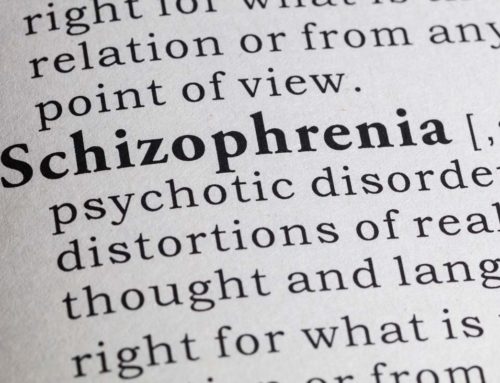Schizophrenia is a chronic and complex mental illness that affects a person’s fundamental thoughts, emotions and behaviors. Schizophrenia is severe and may cause a person to lose touch with reality. Around 3.2 million Americans live with schizophrenia, with 100,000 new cases being diagnosed every year.[1] Schizophrenia usually develops between ages 15 to 36[2]. Schizophrenia can easily incapacitate a person and become a life-long disability. However, there are outstanding treatments that can give a person a reasonably normal and satisfying life.[3]
Signs and Symptoms
Schizophrenia has three categories of symptoms: positive, negative, and cognitive. A person may be diagnosed with some symptoms and not others. Some people have no noticeable symptoms of psychosis (loss of touch with reality).
Positive symptoms: “Positive” symptoms aren’t good; positive symptoms are behaviors not seen in mentally healthy people. Positive symptoms include:
- Thought disorders (unusual or dysfunctional ways of thinking)
- Hallucinations (seeing or hearing things that aren’t there)
- Delusions
- Agitated body movements
Negative symptoms: “Negative” symptoms refer to behaviors that are typically found in people without schizophrenia but are absent in those with it.
- Lack of apparent emotions (flat affect or blunted affect)
- Little ability to feel pleasure (anhedonia)
- Little ability to start activities or be spontaneous
- Little speaking, little to no interest in socializing.
Cognitive symptoms: Cognitive symptoms affect how well a person thinks. These symptoms include:
- Poor short-term memory
- Trouble paying attention, trouble concentrating, impaired ability to focus
- Impaired executive functioning (the ability to take in information, assess it and use that information to perform a task)
Risk Factors
Genes. Schizophrenia can run in families. Having a first-order relative with schizophrenia increases a person’s chances of developing the disorder.[4]
Environment. Scientists believe the interaction between genetics and the environment influences the development of schizophrenia. Factors that seem to influence schizophrenia include:
- Irregularities in brain chemicals. The neurotransmitters dopamine and glutamate seem to be almost always involved in schizophrenia.
- Exposure to viruses in infancy or during gestation
- Inadequate nutrition before birth
- Trauma during birth
Treatments and Therapies
There isn’t a cure for schizophrenia yet, so treatment is focused on the reduction of symptoms and learning to manage one’s illness.
Antipsychotics
Antipsychotics are powerful medications that can have a dramatic effect on schizophrenia, allowing many people to have a high level of functioning.
Psychotherapy
Psychotherapy was for years thought to be ineffective for schizophrenia, but over the last decade studies have indicated that a combination of psychotherapy and medication can be beneficial[5]. Psychotherapy teaches a client with schizophrenia skills and techniques that allow them to manage their illness at home, with the proper support.
If you or a loved one has experienced any symptoms of schizophrenia, please seek help from your local Spokane healthcare professional. Reach out to Damaris through her contact page or calling 509-342-6592.
[1] https://www.nimh.nih.gov/health/topics/schizophrenia/index.shtml
[2] https://www.ncbi.nlm.nih.gov/pubmed/15916472/
[3] https://www.nimh.nih.gov/health/statistics/schizophrenia.shtml
[4] https://experts.umn.edu/en/publications/schizophrenia-and-genetics-a-twin-study-vantage-point



